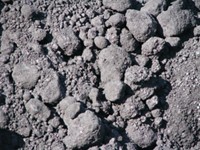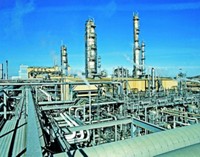Advertisement
Grab your lab coat. Let's get started
Welcome!
Welcome!
Create an account below to get 6 C&EN articles per month, receive newsletters and more - all free.
It seems this is your first time logging in online. Please enter the following information to continue.
As an ACS member you automatically get access to this site. All we need is few more details to create your reading experience.
Not you? Sign in with a different account.
Not you? Sign in with a different account.
ERROR 1
ERROR 1
ERROR 2
ERROR 2
ERROR 2
ERROR 2
ERROR 2
Password and Confirm password must match.
If you have an ACS member number, please enter it here so we can link this account to your membership. (optional)
ERROR 2
ACS values your privacy. By submitting your information, you are gaining access to C&EN and subscribing to our weekly newsletter. We use the information you provide to make your reading experience better, and we will never sell your data to third party members.
Business
Eastman Pushes Gasification
Company says multi-billion-dollar projects are an end run around energy prices
by Alexander H. Tullo
August 6, 2007
| A version of this story appeared in
Volume 85, Issue 32

ALTHOUGH MANY COMPANIES in North America are staying out of commodity chemicals, Eastman is plunging into the business with technology that may be new to the chemical industry but is not new to Eastman. The company has signed on to two industrial gasification projects, each one a $1.6 billion investment, on the U.S. Gulf Coast.
Eastman will take a 50% stake in a project in Beaumont, Texas, that will use gasification to produce syngas, a mixture of carbon monoxide and hydrogen that then is used to make methanol and ammonia. A yet-to-be-named private equity firm will also take a stake in the venture.
The Beaumont project is scheduled to be completed in 2011. Air Products & Chemicals will build air separation plants capable of supplying 2.6 million metric tons per year of oxygen to the gasifiers. It will also market hydrogen produced by the complex. Eastman plans to run the syngas through an idle Terra Industries plant in Beaumont that can make 225 million gal of methanol and 255,000 metric tons of ammonia per year.
Eastman will take a 25% stake in another project, Faustina Hydrogen Products, which is expected to open in St. James Parish, La., in 2010. Faustina is also backed by the D. E. Shaw Group and Goldman Sachs. That project will have a configuration similar to the one in Texas, but it will yield more ammonia and less hydrogen.
Rather than consume natural gas, the traditional syngas feedstock, both projects will rely mostly on coke, a coal-like by-product from refineries that Eastman says is normally cheaper than coal. The carbon dioxide produced in both plants will be marketed to oil firms that use it for enhanced drilling.
Eastman will buy the ventures' methanol output, which it will ultimately use to make raw materials such as propylene and ethylene oxide. The company, however, is still developing the technology for such processes and hasn't settled on a final slate of derivatives.
Eastman CEO J. Brian Ferguson told analysts after the project was announced that this uncertainty is not a problem. "We don't feel like we have a need to wait on doing these projects while we sort out the methanol derivative portfolio," he said. "The value of these projects is very high just on the hydrogen, methanol, and ammonia."
The key to the projects is that they will take the market volatility out of producing methanol and ammonia from natural gas. North American manufacturing of these chemicals has largely ended, and companies have instead turned to offshore production based on cheap natural gas. Ferguson said Eastman's projects will be competitive with such offshore facilities.
Eastman is the only U.S. chemical company to employ coal gasification on a commercial scale. Since 1983, its Kingsport, Tenn., plant has used the technology to make acetic acid, acetic anhydride, and acetate fiber such as tow, which is used for cigarette filters. Eastman's coal-based fibers division accounted for only 12% of sales but 35% of its operating profits in 2006.
P. J. Juvekar, a stock analyst with Citigroup, acknowledges that gasification is a technology risk for a chemical company, but he says Eastman may have the best chance with it.





Join the conversation
Contact the reporter
Submit a Letter to the Editor for publication
Engage with us on Twitter